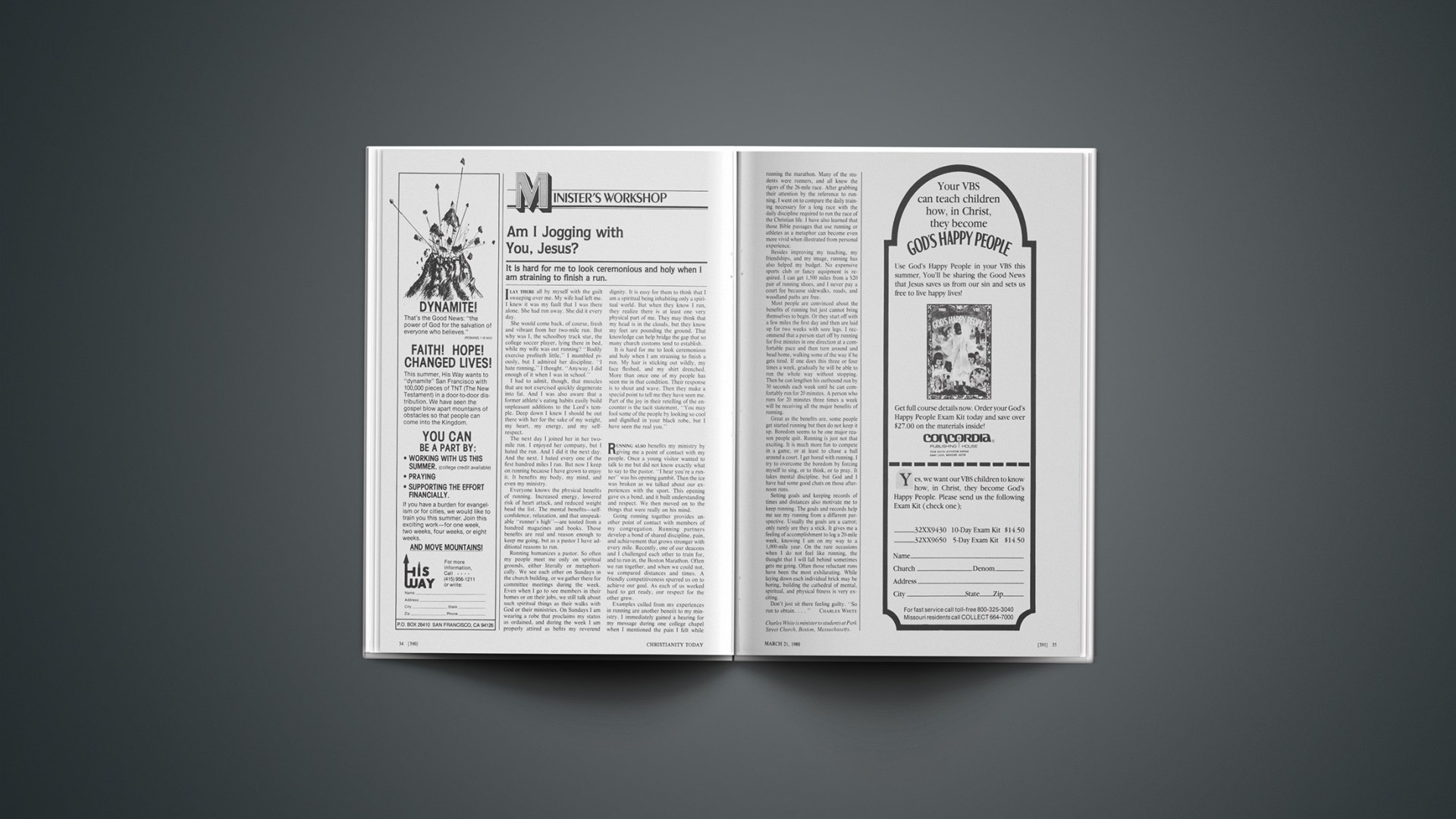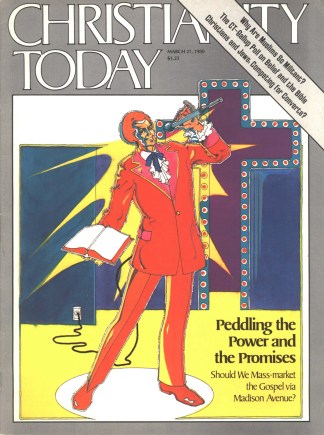It is hard for me to look ceremonious and holy when I am straining to finish a run.
I lay there all by myself with the guilt sweeping over me. My wife had left me. I knew it was my fault that I was there alone. She had run away. She did it every day.
She would come back, of course, fresh and vibrant from her two-mile run. But why was I, the schoolboy track star, the college soccer player, lying there in bed, while my wife was out running? “Bodily exercise profiteth little,” I mumbled piously, but I admired her discipline. “I hate running,” I thought. “Anyway, I did enough of it when I was in school.”
I had to admit, though, that muscles that are not exercised quickly degenerate into fat. And I was also aware that a former athlete’s eating habits easily build unpleasant additions to the Lord’s temple. Deep down I knew I should be out there with her for the sake of my weight, my heart, my energy, and my self-respect.
The next day I joined her in her two-mile run. I enjoyed her company, but I hated the run. And I did it the next day. And the next. I hated every one of the first hundred miles I ran. But now I keep on running because I have grown to enjoy it. It benefits my body, my mind, and even my ministry.
Everyone knows the physical benefits of running. Increased energy, lowered risk of heart attack, and reduced weight head the list. The mental benefits—self-confidence, relaxation, and that unspeakable “runner’s high”—are touted from a hundred magazines and books. Those benefits are real and reason enough to keep me going, but as a pastor I have additional reasons to run.
Running humanizes a pastor. So often my people meet me only on spiritual grounds, either literally or metaphorically. We see each other on Sundays in the church building, or we gather there for committee meetings during the week. Even when I go to see members in their homes or on their jobs, we still talk about such spiritual things as their walks with God or their ministries. On Sundays I am wearing a robe that proclaims my status as ordained, and during the week I am properly attired as befits my reverend dignity. It is easy for them to think that I am a spiritual being inhabiting only a spiritual world. But when they know I run, they realize there is at least one very physical part of me. They may think that my head is in the clouds, but they know my feet are pounding the ground. That knowledge can help bridge the gap that so many church customs tend to establish.
It is hard for me to look ceremonious and holy when I am straining to finish a run. My hair is sticking out wildly, my face flushed, and my shirt drenched. More than once one of my people has seen me in that condition. Their response is to shout and wave. Then they make a special point to tell me they have seen me. Part of the joy in their retelling of the encounter is the tacit statement, “You may fool some of the people by looking so cool and dignified in your black robe, but I have seen the real you.”
Running also benefits my ministry by giving me a point of contact with my people. Once a young visitor wanted to talk to me but did not know exactly what to say to the pastor. “I hear you’re a runner” was his opening gambit. Then the ice was broken as we talked about our experiences with the sport. This opening gave us a bond, and it built understanding and respect. We then moved on to the things that were really on his mind.
Going running together provides another point of contact with members of my congregation. Running partners develop a bond of shared discipline, pain, and achievement that grows stronger with every mile. Recently, one of our deacons and I challenged each other to train for, and to run in, the Boston Marathon. Often we ran together, and when we could not, we compared distances and times. A friendly competitiveness spurred us on to achieve our goal. As each of us worked hard to get ready, our respect for the other grew.
Examples culled from my experiences in running are another benefit to my ministry. I immediately gained a hearing for my message during one college chapel when I mentioned the pain I felt while running the marathon. Many of the students were runners, and all knew the rigors of the 26-mile race. After grabbing their attention by the reference to running, I went on to compare the daily training necessary for a long race with the daily discipline required to run the race of the Christian life. I have also learned that those Bible passages that use running or athletes as a metaphor can become even more vivid when illustrated from personal experience.
Besides improving my teaching, my friendships, and my image, running has also helped my budget. No expensive sports club or fancy equipment is required. I can get 1,500 miles from a $20 pair of running shoes, and I never pay a court fee because sidewalks, roads, and woodland paths are free.
Most people are convinced about the benefits of running but just cannot bring themselves to begin. Or they start off with a few miles the first day and then are laid up for two weeks with sore legs. I recommend that a person start off by running for five minutes in one direction at a comfortable pace and then turn around and head home, walking some of the way if he gets tired. If one does this three or four times a week, gradually he will be able to run the whole way without stopping. Then he can lengthen his outbound run by 30 seconds each week until he can comfortably run for 20 minutes. A person who runs for 20 minutes three times a week will be receiving all the major benefits of running.
Great as the benefits are, some people get started running but then do not keep it up. Boredom seems to be one major reason people quit. Running is just not that exciting. It is much more fun to compete in a game, or at least to chase a ball around a court. I get bored with running. I try to overcome the boredom by forcing myself to sing, or to think, or to pray. It takes mental discipline, but God and I have had some good chats on those afternoon runs.
Setting goals and keeping records of times and distances also motivate me to keep running. The goals and records help me see my running from a different perspective. Usually the goals are a carrot; only rarely are they a stick. It gives me a feeling of accomplishment to log a 20-mile week, knowing I am on my way to a 1,000-mile year. On the rare occasions when I do not feel like running, the thought that I will fall behind sometimes gets me going. Often those reluctant runs have been the most exhilarating. While laying down each individual brick may be boring, building the cathedral of mental, spiritual, and physical fitness is very exciting.
Don’t just sit there feeling guilty. “So run to obtain.…”
Charles White is minister to students at Park Street Church, Boston, Massachusetts.










